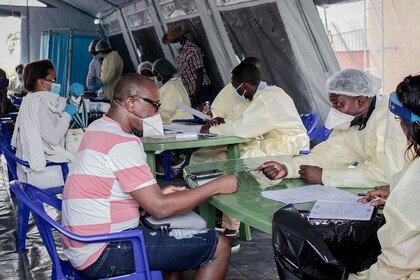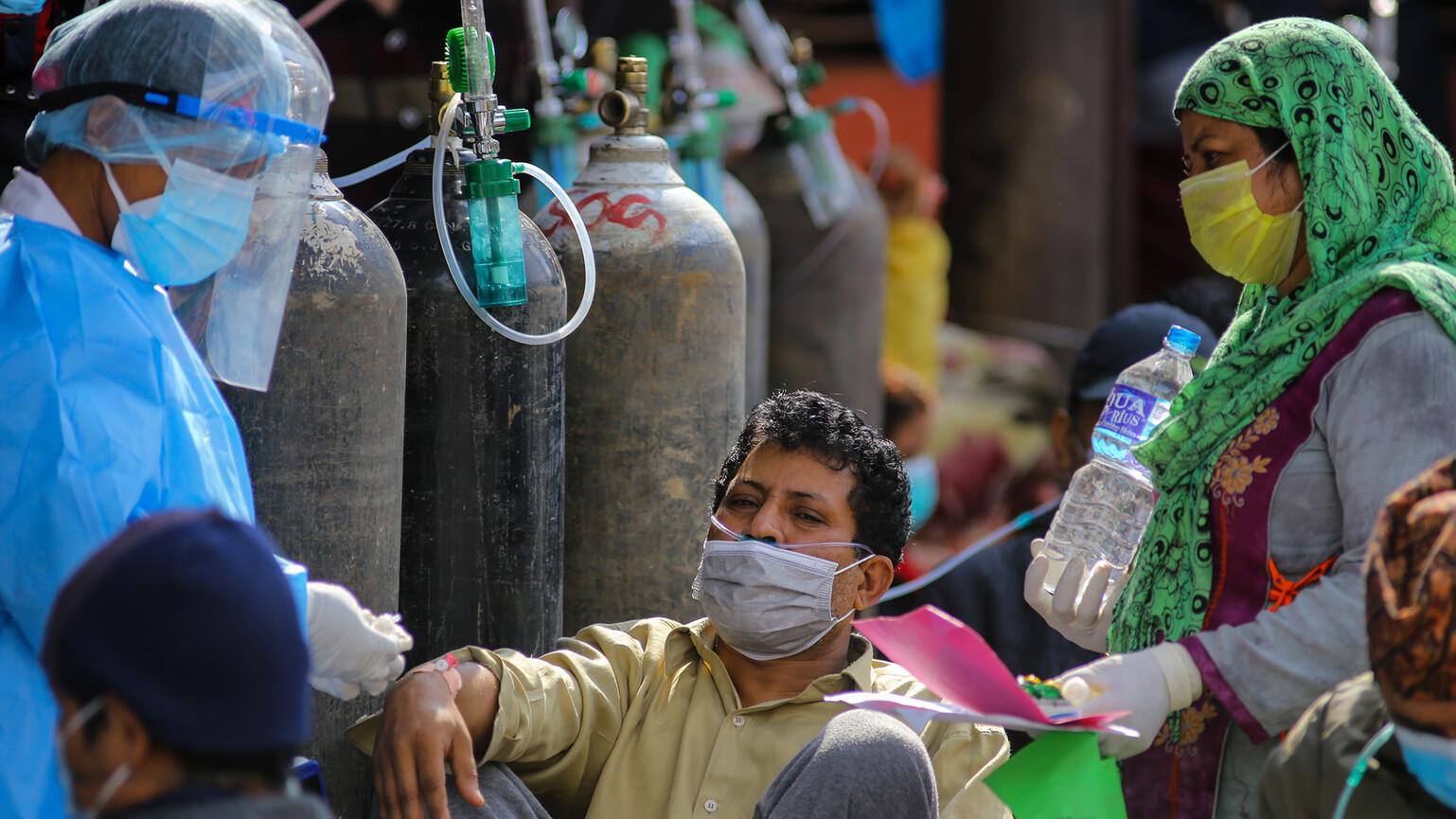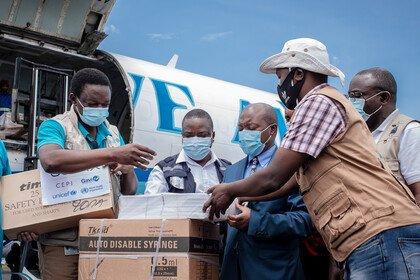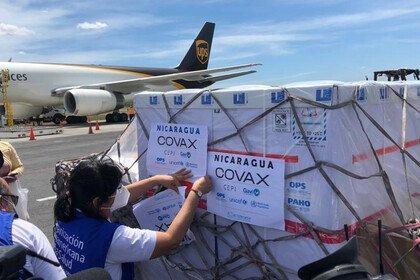
3 things G7 leaders can do to end the Covid-19 pandemic
The G7 summit is a critical opportunity for political leaders to change the course of the Covid-19 pandemic and concretely discuss how we need to better prevent pandemics in the future.

Sunil Pradhan / Anadolu Agency via Getty Images)
Our hopes were pinned on courageous, collective leadership at the Global Health Summit in May. There were commitments to be proud of but there were also missed opportunities that the upcoming G7 summit must grasp.
Here are three things global leaders must commit to in order to bring the Covid-19 pandemic to an end.
1. Commit sustained, coordinated financial support for the ACT-Accelerator
We know how to defeat this virus and have tools to do it: vaccines, tests and treatments. Initiatives like the ACT-Accelerator are designed to make these tools available more equitably around the world.
However, this hard-won progress is at grave risk due to significant underfunding. An $18.1 billion funding gap for the ACT-Accelerator is hindering the rollout of Covid-19 tools in many low- and middle-income countries this year.
Governments, the private sector, and philanthropists raised considerable funds for the ACT-Accelerator, but this ad-hoc funding model is not sustainable or enough to close the gap in 2021.
We need a systematic solution that shares the financial costs fairly.
There have been some positive commitments. The Rome Declaration, released at the end of the Global Health Summit, reaffirmed leaders’ support for the ACT-Accelerator and underlined the necessity to share the financial burden and close the funding gap. To emphasise their support for the ACT-Accelerator, a handful of countries like France, Italy and Switzerland pledged additional funds to the ACT-Accelerator.
What must happen at the G7 Summit?
The only way to close the ACT-Accelerator funding gap is through bold, collective action this year and beyond.
By committing to a fair share financing framework, the G7 countries could cover up to two-thirds of the ACT-Accelerator costs in 2021 and help end the acute phase of the pandemic this year. So far, only Germany and Canada have committed their fair share to the ACT-Accelerator. We urgently need more G7 leaders to follow their lead.
Without concerted collective action this pandemic will rage for much longer than it should. That will translate into many more lives and livelihoods lost.
2. Commit to sharing 1 billion Covid-19 vaccine doses with COVAX by the end of 2021
Over 60% of the world’s population live in countries that won't see widespread vaccine coverage until 2022 or even later. This gives the virus the opportunity to thrive and mutate, potentially leading to new variants which our existing vaccines may be unable to stop.
This puts everyone, everywhere at risk.
Our best protection from variants is to stop them developing. We can do this by ensuring everyone, everywhere has access to Covid-19 vaccines.
With much of this year’s vaccine manufacturing capacity already bought up and vaccine exports from India grinding to a halt, the best way to ensure global vaccine access in 2021 is for G7 and G20 countries to share vaccine doses through COVAX.
In May, a number of countries pledged to share doses. The United States pledged 80 million doses to low and middle-income countries. At the Global Health Summit, European Union member states made significant commitments to share doses with COVAX, with Germany and France pledging 30 million doses each and Italy pledging 15 million doses this year. Spain joined shortly after by pledging a total of 22.5 million doses this year. The European Commission hopes that Team Europe will share 100 million doses by the end of 2021.
What must happen at the G7 Summit?
Vaccine sharing through COVAX must be ramped up urgently.
The G7 can and must commit to cumulatively share 1 billion Covid-19 vaccine doses in 2021, starting immediately, in parallel to their national roll outs and scaling up as more of their population is vaccinated.
This is entirely achievable. Analysis from the ONE campaign has shown that the G7 and Australia could vaccinate their entire populations and still have 1.2 billion extra doses.
The sooner the G7 commits to sharing doses through COVAX and provides a roadmap for doing so, the sooner we can save lives around the world, protect the vulnerable and end the pandemic.
3. Rethink pandemic preparedness so that we can better cope with the next crisis
Funding of pandemic preparedness and response has been too little, too reliant on ad-hoc bilateral contributions, and too reactive.
This has led to excessive economic and human costs in all countries.
The ACT-Accelerator and vaccine dose sharing are a short-term fix to end the current crisis. But the risk of another pandemic remains high. To prepare for and prevent the next pandemic, we must have a stronger global system in place.
The G20 member states agreed to The Rome Declaration – a set of guiding principles which can help us improve our response to Covid-19 and prepare for future public health emergencies.
Building on the lessons learned from responding to Covid-19 thus far, these principles included:
-
support for the existing multilateral health architecture for preparedness,
-
sustainability funding the WHO,
-
enabling global access to prevention, detection and response tools,
-
investment in surveillance,
-
building local manufacturing capacity and expertise, and
-
addressing the need to finance long-term pandemic preparedness and response.
What must happen at the G7 summit?
Political commitments through initiatives like the Rome Declaration must be combined with meaningful action that will make the world better prepared for the next pandemic.
The world needs a new system for sustainably funding pandemic preparedness and response, enabling adequate and proactive funding of research and development for future and emerging infectious diseases, early warning surveillance systems, and the capacity to finance the surge in costs during a pandemic.
To achieve this, Wellcome is supporting the G20 High-Level Independent Panel (HLIP) on Financing the Global Commons for Pandemic Preparedness and Response to assess gaps in current financing systems, and to develop actionable recommendations for change, including by leveraging public, private, philanthropic and International Financial Institutions funds. We need the leaders of the G7 to give political support for the Panel’s vital work and take forward its recommendations.
The G7 Summit is an historic opportunity to move the needle on these three elements. But only if our leaders are able to act courageously and collectively.


